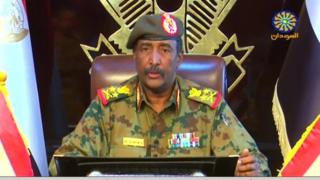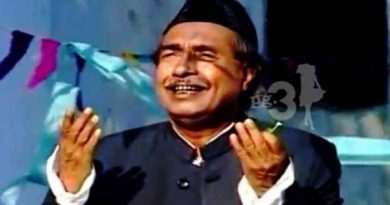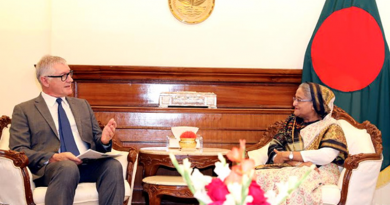Sudan coup: Military leader vows to ‘uproot regime’
The leader of Sudan’s interim military council has vowed to “uproot the regime” two days after a military coup.
Speaking on TV, Lt-Gen Abdel Fattah Abdelrahman Burhan announced the restructuring of state institutions, the end of a night curfew and the release of political prisoners.
Protests continue despite the ousting of long-time leader Omar al-Bashir.
Demonstrators have demanded an immediate move to civilian rule and vow to stay in the streets.
Gen Burhan, who replaced the coup leader after he resigned on Friday, also dissolved all provincial governments and pledged respect for human rights.
The army would maintain “peace, order and security” across Sudan during an already announced transition period that would last at most two years until elections could be and civilian rule introduced, he added.
Using a more conciliatory tone, Gen Burhan also called on the opposition to “help us restore normal life”, promised to try those who killed demonstrators and vowed a war on corruption.
The speech followed the resignation of feared security chief Gen Salah Gosh hours after the coup leader himself, Defence Minister Awad Ibn Auf, stepped aside.
No official reason has been given for either departure.
What has the opposition said?
Opposition groups are reportedly meeting with the military to discuss “transitional arrangements”.
The Sudan Professionals Association (SPA), which has been spearheading the demonstrations, urged the armed forces to “ensure the immediate transfer of power to a transitional civilian government.”
It also called for protests to continue.
Omar el-Digeir, leader of the opposition Sudanese Congress Party, said the military should not be “the sole custodians of power”.
A growing economic crisis has gripped the country since the oil-rich southern part split away in 2011, and Thursday’s coup followed months of unrest over rising prices.
How did we get here?
When Mr Bashir was removed, he was replaced by a military council led by Mr Ibn Auf.
But demonstrators camping out outside army headquarters in the capital Khartoum refused to disperse, rejecting Mr Ibn Auf as an ally of Mr Bashir.
Mr Ibn Auf was head of military intelligence during the Darfur conflict and the US imposed sanctions on him in 2007.
On Friday the new leader announced he was resigning and being replaced by Gen Burhan, who is seen as a less controversial figure.
Protestors have called for the abolition of “arbitrary decisions by leaders that do not represent the people” and the detention of “all symbols of the former regime who were involved in crimes against the people”.
“Until these demands are fully met, we must continue with our sit-in at the General Command of the Armed Forces,” the SPA said.
On Saturday, Sudanese TV reported the resignation of Gen Gosh, head of the National Intelligence and Security Service (NISS) which has powerful forces within the capital.
The general has been a key ally of Mr Bashir since the early 1990s and is among 17 Sudanese officials indicted for genocide, human right abuses and war crimes in the Darfur region by the International Criminal Court (ICC) in 2009.
The NISS has extensive powers and influence, supervising the paramilitary Rapid Support Forces.
At least 16 people have been killed by stray bullets at the protests since Thursday, police say.




